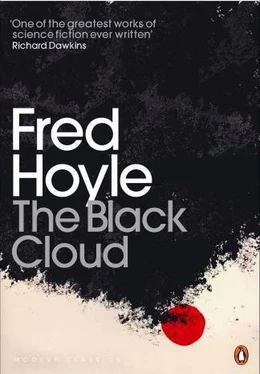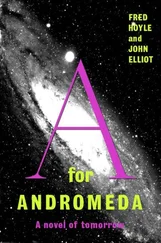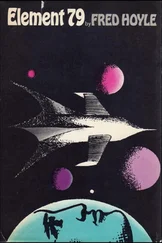Fred Hoyle - The Black Cloud
Здесь есть возможность читать онлайн «Fred Hoyle - The Black Cloud» весь текст электронной книги совершенно бесплатно (целиком полную версию без сокращений). В некоторых случаях можно слушать аудио, скачать через торрент в формате fb2 и присутствует краткое содержание. Жанр: Фантастика и фэнтези, на английском языке. Описание произведения, (предисловие) а так же отзывы посетителей доступны на портале библиотеки ЛибКат.
- Название:The Black Cloud
- Автор:
- Жанр:
- Год:неизвестен
- ISBN:нет данных
- Рейтинг книги:5 / 5. Голосов: 1
-
Избранное:Добавить в избранное
- Отзывы:
-
Ваша оценка:
- 100
- 1
- 2
- 3
- 4
- 5
The Black Cloud: краткое содержание, описание и аннотация
Предлагаем к чтению аннотацию, описание, краткое содержание или предисловие (зависит от того, что написал сам автор книги «The Black Cloud»). Если вы не нашли необходимую информацию о книге — напишите в комментариях, мы постараемся отыскать её.
The Black Cloud — читать онлайн бесплатно полную книгу (весь текст) целиком
Ниже представлен текст книги, разбитый по страницам. Система сохранения места последней прочитанной страницы, позволяет с удобством читать онлайн бесплатно книгу «The Black Cloud», без необходимости каждый раз заново искать на чём Вы остановились. Поставьте закладку, и сможете в любой момент перейти на страницу, на которой закончили чтение.
Интервал:
Закладка:
“Don’t I detect a slight smell of rat in all this?’ Barnett remarked.
“Possibly. I don’t know how keen your sense of smell is, Bill. What’s your trouble?”
“I’ve got lots of troubles. I should have thought that your remarks about condensing into a planet apply only to an inanimate cloud. If we grant that the Cloud is able to control the distribution of material within itself, then it could easily prevent condensation from taking place. After all, condensation must be a sort of instability process and I would have thought that quite a moderate degree of control on the part of your beast could prevent any condensation at all.”
“There are two replies to that. One is that I believe the beast will lose his control if he stays too long near the Sun. If he stays too long, the magnetic field of the Sun will penetrate into the Cloud. Then the rotation of the Cloud round the Sun will twist up the magnetic field to blazes. All control would then be lost.”
“My God, that’s an excellent point.”
“It is, isn’t it? And here’s another one. However different our beast is to life here on Earth, one point he must have in common with us. We must both obey the simple biological rules of selection and development. By that I mean that we can’t suppose that the Cloud started off by containing a fully-fledged beast. It must have started with small beginnings, just as life here on Earth started with small beginnings. So, to start with, there would be no intricate control over the distribution of material in the Cloud. Hence if the Cloud had originally been situated close to a star, it could not have prevented condensation into a planet or into a number of planets.”
“Then how do you visualize the early beginnings?”
“As something that happened far out in interstellar space. To begin with, life in the Cloud must have depended on the general radiation field of the stars. Even that would give it more radiation for molecule-building purposes than life on the Earth gets. Then I imagine that as intelligence developed it would be discovered that food supplies — i.e. molecule-building — could be enormously increased by moving in close to a star for a comparatively brief period. As I see it, the beast must be essentially a denizen of interstellar space. Now, Bill, have you any more troubles?”
“Well, yes, I’ve got another problem. Why can’t the Cloud manufacture its own radiation? Why bother to come in close to a star? If it understands nuclear fusion to the point of producing gigantic explosions, why not use nuclear fusion for producing its supply of radiation?”
“To produce radiation in a controlled fashion requires a slow reactor, and of course that’s just what a star is. The Sun is just a gigantic slow nuclear fusion reactor. To produce radiation on any real scale comparable with the Sun, the Cloud would have to make itself into a star. Then the beast would get roasted. It’d be much too hot inside.”
“Even then I doubt whether a cloud of this mass could produce very much radiation,” remarked Marlowe. “Its mass is much too small. According to the mass-luminosity relation it’d be down as compared with the Sun by a fantastic amount. No, you’re barking up a wrong tree there, Bill.”
“I’ve a question that I’d like to ask,” said Parkinson. “Why do you always refer to your beast in the singular? Why shouldn’t there be lots of little beasts in the Cloud?”
“I have a reason for that, but it’ll take quite a while to explain.”
“Well, it looks as if we’re not going to get much sleep tonight, so you’d better carry on.”
“Then let’s start by supposing that the Cloud contains lots of little beasts instead of one big beast. I think you’ll grant me that communication must have developed between the different individuals.”
“Certainly.”
“Then what form will the communication take?”
“You’re supposed to be telling us, Chris.”
“My question was purely rhetorical. I suggest that communication would be impossible by our methods. We communicate acoustically.”
“You mean by talking. That’s certainly your method all right, Chris,” said Ann Halsey.
But the point was lost on Kingsley. He went on:
“Any attempt to use sound would be drowned by the enormous amount of background noise that must exist inside the Cloud. It would be far worse than trying to talk in a roaring gale. I think we can be pretty sure that communication would have to take place electrically.”
“That seems fair enough.”
“Good. Well, the next point is that by our standards the distances between the individuals would be very large, since the Cloud by our standards is enormously large. It would obviously be intolerable to rely on essentially D.C. methods over such distances.”
“D.C. methods? Chris, will you please try to avoid jargon?”
“Direct current.”
“That explains it, I suppose!”
“Oh, the sort of thing we get on the telephone. Roughly speaking, the difference between D.C. communication and A.C. communication is the difference between the telephone and radio.”
Marlowe grinned at Ann Halsey.
“What Chris is trying to say in his inimitable manner is that communication must occur by radiative propagation.”
“If you think that makes it clearer …”
“Of course it’s clear. Stop being obstructive, Ann. Radiative propagation occurs when we emit a light signal or a radio signal. It travels across space through a vacuum at a speed of 186,000 miles per second. Even at this speed it would still take about ten minutes for a signal to travel across the Cloud.
“My next point is that the volume of information that can be transmitted radiatively is enormously greater than the amount that we can communicate by ordinary sound. We’ve seen that with our pulsed radio transmitters. So if this Cloud contains separate individuals, the individuals must be able to communicate on a vastly more detailed scale than we can. What we can get across in an hour of talk they might get across in a hundredth of a second.”
“Ah, I begin to see light,” broke in McNeil. “If communication occurs on such a scale then it becomes somewhat doubtful whether we should talk any more of separate individuals!”
“You’re home, John!”
“But I ’ m not home,” said Parkinson.
“In vulgar parlance,” said McNeil amiably, “what Chris is saying is that individuals in the Cloud, if there are any, must be highly telepathic, so telepathic that it becomes rather meaningless to regard them as being really separate from each other.”
“Then why didn’t he say so in the first place?’ — from Ann Halsey.
“Because like most vulgar parlance, the word “telepathy” doesn’t really mean very much.”
“Well, it certainly means a great deal more to me.”
“And what does it mean to you, Ann?”
“It means conveying one’s thoughts without talking, or of course without writing or winking or anything like that.”
“In other words it means — if it means anything at all — communication by a non-acoustic medium.”
“And that means using radiative propagation,” chipped in Leicester.
“And radiative propagation means the use of alternating currents, not the direct currents and voltages we use in our brains.”
“But I thought we were capable of some degree of telepathy,” suggested Parkinson.
“Rubbish. Our brains simply don’t work the right way for telepathy. Everything is based on D.C. voltages, and radiative transmission is impossible that way.”
“I know this is rather a red herring, but I thought these extra-sensory people had established some rather remarkable correlations,” Parkinson persisted.
Читать дальшеИнтервал:
Закладка:
Похожие книги на «The Black Cloud»
Представляем Вашему вниманию похожие книги на «The Black Cloud» списком для выбора. Мы отобрали схожую по названию и смыслу литературу в надежде предоставить читателям больше вариантов отыскать новые, интересные, ещё непрочитанные произведения.
Обсуждение, отзывы о книге «The Black Cloud» и просто собственные мнения читателей. Оставьте ваши комментарии, напишите, что Вы думаете о произведении, его смысле или главных героях. Укажите что конкретно понравилось, а что нет, и почему Вы так считаете.












